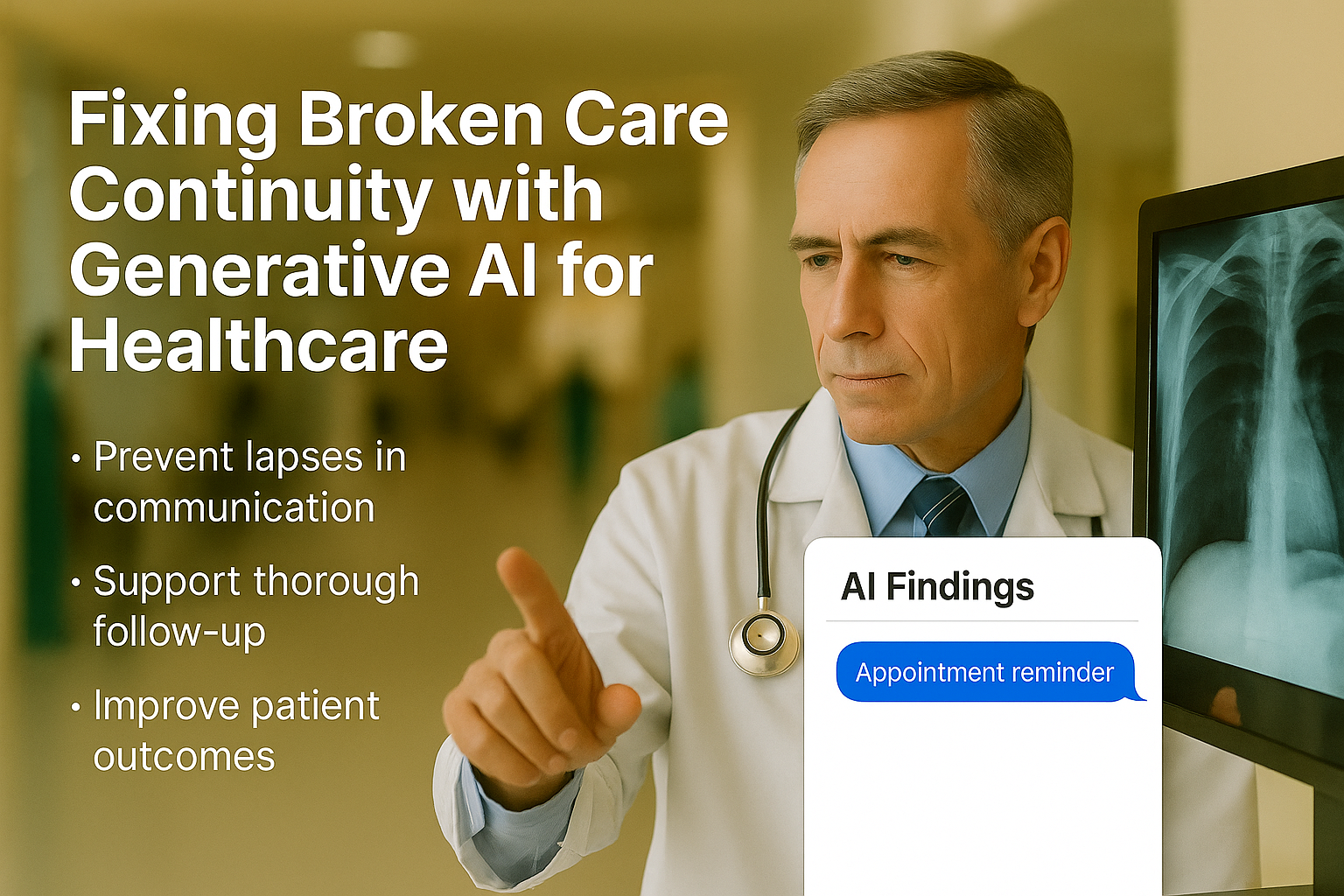
In today’s increasingly complex healthcare systems, one of the most persistent and costly problems is the breakdown in care continuity. Patients frequently move between multiple providers, departments, and care settings, and with each transition, the risk of miscommunication, lost information, and fragmented care increases. These gaps can lead to delayed treatments, repeated diagnostics, medication errors, and ultimately, poorer health outcomes.
Generative AI for healthcare has emerged as a transformative solution to this long-standing challenge. By leveraging natural language processing (NLP), machine learning, and intelligent automation, generative AI for healthcare has the potential to create a seamless, connected, and efficient patient journey.
Understanding Care Continuity and Its Breakdown
Care continuity refers to the degree to which a patient’s healthcare is coordinated and uninterrupted across different stages and providers. Ideally, patients should experience a smooth flow of information, care plans, and support from their first consultation through treatment, recovery, and follow-up.
- Unfortunately, real-world healthcare is full of obstacles to this continuity:
- Siloed data systems prevent information sharing between providers.
- Inconsistent documentation leads to incomplete patient histories.
- Time constraints and high workloads result in missed handoffs.
- Lack of real-time communication between care teams causes delays.
The consequences are serious. According to the Joint Commission, breakdowns in communication are a leading cause of sentinel events in hospitals. Patients fall through the cracks, and healthcare costs spiral.
This is where generative AI for healthcare plays a game-changing role.
How Generative AI for Healthcare Enhances Care Continuity
1. Unified Patient Summaries
Generative AI for healthcare can pull structured and unstructured data from EHRs, lab systems, and clinical notes to generate a comprehensive and easy-to-digest patient summary. These summaries give every clinician along the care path a clear, up-to-date picture of the patient’s health, past treatments, medications, and allergies.
No more piecing together information from different departments or relying on patients to remember their medical histories — AI fills in the gaps with speed and accuracy.
2. Intelligent Handoff Tools
Clinical handoffs between shifts or departments are a common point of failure. Generative AI for healthcare can automate handoff summaries by extracting the most relevant information from ongoing notes, test results, and orders. This ensures the incoming care team gets a clear, consistent, and complete update without relying solely on manual entries.
Automated handoff tools reduce errors, improve communication, and save time during transitions.
3. Real-Time Care Coordination
Generative AI for healthcare can power intelligent care coordination systems that track a patient’s journey across appointments, diagnostics, admissions, and discharges. AI tools can alert care managers about gaps in follow-up, needed referrals, or delays in test results — allowing for proactive intervention.
This continuous visibility improves responsiveness and ensures patients don’t fall through the cracks.
4. Personalized Discharge Planning
Discharge is a critical moment for care continuity. Poor discharge instructions or missing follow-up appointments can lead to readmissions.
Generative AI for healthcare helps by generating personalized discharge summaries tailored to the patient’s diagnosis, treatment, medication, and home care needs. AI can even generate patient-facing educational material at appropriate reading levels, ensuring comprehension.
5. Automated Referral and Follow-Up Management
Missed referrals are a common cause of care discontinuity. Generative AI for healthcare can track referral orders, auto-generate specialist notes, and prompt follow-up scheduling. Integration with patient communication platforms allows automatic reminders and updates, reducing no-shows and improving adherence.
6. Cross-Platform Data Integration
Modern patients receive care from a mix of hospitals, private practices, telehealth providers, and labs — all using different systems. Generative AI for healthcare can act as a universal translator, interpreting and unifying data from disparate platforms. Through APIs and NLP models, AI enables seamless data exchange even when formal interoperability is lacking.
Real-World Applications and Success Stories
Mayo Clinic implemented AI-based tools that compile patient records across departments, creating a single longitudinal view for providers.
Mount Sinai uses generative AI to generate real-time summaries for multidisciplinary rounds, improving care transitions.
Geisinger Health System reduced readmission rates by using AI to ensure timely post-discharge follow-ups and medication reconciliation.
These examples show how generative AI for healthcare is already addressing care continuity challenges.
The ROI of Improved Continuity Through Generative AI
Investing in generative AI for healthcare brings measurable returns:
- Reduced duplication of tests and procedures
- Lower readmission and emergency department visit rates
- Improved medication adherence
- Higher patient satisfaction and trust
- Better provider collaboration and morale
The cost savings from preventing complications and unnecessary interventions alone can justify AI implementation.
Ethical and Operational Considerations
While generative AI for healthcare offers significant benefits, there are important considerations:
Ensuring data privacy and security across shared systems
Avoiding algorithmic bias that may affect vulnerable populations
Maintaining clinician oversight to validate AI-generated outputs
Training staff to use AI tools effectively
Proper governance, clear workflows, and continuous monitoring are essential for safe and effective deployment.
Future Directions: Toward Truly Connected Care
As technology matures, generative AI for healthcare will play an even larger role in achieving truly connected care. Future developments may include:
AI-driven care navigation assistants for patients and families
Predictive modeling to anticipate care gaps before they occur
Context-aware AI that understands clinical nuance and adapts outputs accordingly
Real-time language translation for global or multilingual healthcare delivery
Conclusion
Broken care continuity is a systemic issue, but not an insurmountable one. Generative AI for healthcare provides powerful tools to bridge information gaps, streamline handoffs, personalize care plans, and keep every member of the care team on the same page.
By embedding intelligence into every layer of healthcare delivery, we move closer to a system that is not only efficient but also compassionate and patient-centered.
The promise of generative AI for healthcare is clear: smarter systems, stronger connections, and better outcomes for everyone.













